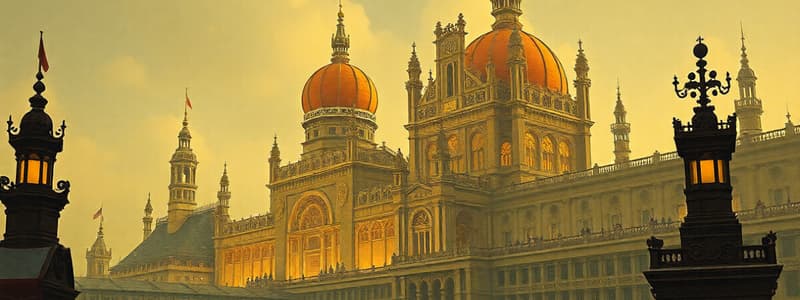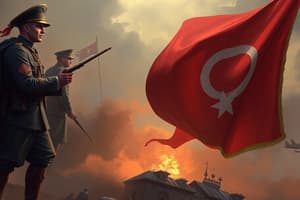Podcast
Questions and Answers
What role did economic factors play in the lead-up to World War I?
What role did economic factors play in the lead-up to World War I?
- They were irrelevant to the tensions between nations.
- They amplified existing rivalries and encouraged imperialism. (correct)
- They solely focused on trade relations between nations.
- They eliminated the need for military alliances.
How did the assassination of Archduke Franz Ferdinand impact Europe?
How did the assassination of Archduke Franz Ferdinand impact Europe?
- It served as the immediate trigger for World War I. (correct)
- It led to a period of long-lasting peace.
- It immediately resolved the ongoing conflicts.
- It had little effect on the existing tensions.
Which of the following best describes the nature of the alliances prior to World War I?
Which of the following best describes the nature of the alliances prior to World War I?
- They created a scenario leading to swift involvement from multiple nations. (correct)
- They prevented any military actions from occurring.
- They were based solely on economic partnerships.
- They were easily dissolved in times of crisis.
What interconnected factors contributed to the unstable atmosphere in Europe before the war?
What interconnected factors contributed to the unstable atmosphere in Europe before the war?
What was a significant consequence of the diplomatic failures following the assassination of Franz Ferdinand?
What was a significant consequence of the diplomatic failures following the assassination of Franz Ferdinand?
What was a direct consequence of imperialist rivalries among European powers?
What was a direct consequence of imperialist rivalries among European powers?
How did militarism contribute to the outbreak of World War I?
How did militarism contribute to the outbreak of World War I?
What role did nationalist ideologies play in the lead-up to World War I?
What role did nationalist ideologies play in the lead-up to World War I?
What effect did the alliance system have on conflicts between European nations?
What effect did the alliance system have on conflicts between European nations?
Which of the following factors directly contributed to the arms race leading up to World War I?
Which of the following factors directly contributed to the arms race leading up to World War I?
Which crisis is often linked to Serbian nationalism before the outbreak of World War I?
Which crisis is often linked to Serbian nationalism before the outbreak of World War I?
What was the main purpose behind forming alliances among European powers before World War I?
What was the main purpose behind forming alliances among European powers before World War I?
What impact did public opinion have on militarism in Europe before World War I?
What impact did public opinion have on militarism in Europe before World War I?
Flashcards
Imperialism's role in WWI
Imperialism's role in WWI
Imperialist competition for colonies and resources heightened tensions and mistrust. Economic gains, military buildup, and strained relationships contributed to conflict.
Alliance System
Alliance System
A complex web of alliances connected European powers. An attack on one member could involve others.
Militarism's Impact
Militarism's Impact
The glorification of military strength and its prominent role in European society contributed to conflict. Countries built armies, prompting a dangerous arms race.
Nationalism's Role
Nationalism's Role
Signup and view all the flashcards
Europe's Alliance System
Europe's Alliance System
Signup and view all the flashcards
Arms Race
Arms Race
Signup and view all the flashcards
Balkan Nationalism
Balkan Nationalism
Signup and view all the flashcards
Assassination of Archduke Franz Ferdinand
Assassination of Archduke Franz Ferdinand
Signup and view all the flashcards
Nationalism's role in WWI
Nationalism's role in WWI
Signup and view all the flashcards
Economic Rivalry in WWI
Economic Rivalry in WWI
Signup and view all the flashcards
Assassination of Franz Ferdinand
Assassination of Franz Ferdinand
Signup and view all the flashcards
Domino Effect of Alliances
Domino Effect of Alliances
Signup and view all the flashcards
Complex Causes of WWI
Complex Causes of WWI
Signup and view all the flashcards
Study Notes
Imperialism's Role in the Outbreak of World War I
- Imperialist rivalries fostered intense competition among European powers for colonies and resources.
- This competition led to heightened tension and mistrust, creating a climate of hostility ripe for conflict.
- European powers aggressively pursued colonies in Africa and Asia, often through military force and diplomatic maneuvering.
- The scramble for colonies contributed directly to strained relationships between nations.
- The economic benefits gained through imperialism fueled the industrial and military advancements that contributed to a global arms race.
- Imperial rivalry contributed to the formation and strengthening of alliances, which would later play a major role in escalating tensions into war.
- Conflicts over colonies and spheres of influence (e.g., in the Balkans) became points of contention, frequently triggering diplomatic crises.
The Alliance System and Entangling Alliances
- A complex web of alliances connected European powers, creating a system where an attack on one member could potentially draw in others.
- These alliances were formed to deter aggression and maintain a balance of power.
- The alliances were often made without full consideration of potential consequences and were based on perceived threats and self-interest.
- The network of alliances made it difficult to contain conflicts, and they escalated disputes into broader European conflicts.
Militarism's Role
- The belief in military strength and the glorification of warfare permeated European society.
- Countries invested heavily in military expansion, constructing large armies and navies, driving an arms race.
- The perceived threat of military aggression further fueled distrust and apprehension among nations.
- Public opinion often supported and even encouraged military buildup, linking it to national pride and prestige.
- Military planning and strategy often drove and magnified diplomatic tensions.
Nationalism Exacerbating Tensions
- Nationalist ideologies emphasized the importance of national identity and self-determination, leading to heightened tensions between nations.
- Intense nationalism in the Balkans, fueled by ethnic and cultural differences, contributed to the regional crises that ultimately led to conflict.
- Serbian nationalism, in particular, played a significant role in the assassination of Archduke Franz Ferdinand, the trigger for World War I.
- Nationalism encouraged competing claims to territory and resources, breeding hostility and conflict.
Economic Factors and the Road to War
- Competition for economic markets and raw materials amplified the existing tensions between European powers.
- Economic rivalry encouraged imperialism and fueled the global arms race.
- Economic interdependence of some nations and conflict was a complex interplay.
- The desire for economic dominance played an often overlooked role in straining relations.
- Economic interests influenced foreign policies, contributing to the political and military entanglement of European nations.
The Assassination of Archduke Franz Ferdinand
- The assassination of Archduke Franz Ferdinand, heir to the Austro-Hungarian throne, by a Serbian nationalist in Sarajevo marked a pivotal moment.
- This event served as the immediate trigger for the outbreak of World War I.
- Reactions to the assassination were swift and escalated tensions on a global scale, demonstrating the interconnectedness of Europe.
- Diplomacy and solutions to the crisis failed as the situation spiraled into a global conflict.
The Spark Ignites the Powder Keg
- The complex interplay of imperialism, alliance systems, militarism, nationalism, and economic factors created a highly volatile atmosphere.
- The assassination served as a catalyst, igniting the already existing tensions into a full-scale global war.
- The domino effect of alliances quickly drew multiple nations into the conflict despite attempts to mediate.
- The complex intertwined histories and current issues of competing empires and nations led to a European-wide confrontation.
Studying That Suits You
Use AI to generate personalized quizzes and flashcards to suit your learning preferences.




